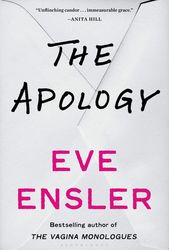When Eve Ensler was five years old, her father began to sexually abuse her. He raped her every night till she was 10. When she gathered the courage to resist him, he became “vicious and brutal”. As she grew older, he beat and tortured her. All her life, Ensler, the acclaimed writer of The Vagina Monologues, yearned for her father to apologise to her for the “monstrosity he unleashed”, but he never did. Finally, 31 years after his death, she penned down an apology to herself as she imagined him saying it, in her latest book, The Apology.
Through a first-person narration, Ensler dissects her father’s infernal character in his own voice, giving an uncomfortably detailed account of all that he did to her. “He had led me to develop infections, suffer night terrors and become hysterical,” says Ensler during an interaction with a group of journalists in Mumbai. “I had lost my appetite, my demeanour underwent a change and I became sullen, depressed and withdrawn from the carefree and chatty girl I had once been.” Even as Ensler went on to carve a successful career as an author, activist and performer, the baggage of what she had been through as a girl remained “trapped inside of her”.
Intriguingly, despite her mother and her siblings living in the same house with her, no one one tried to stop her father. “My mother absolutely knew about the violence because she was a witness, but she never tried to protect me,” says Ensler. “As a child, I really hated her.” When she finally confronted her mother a few years before she died, Ensler got her first apology for the torture she had endured. “She confessed that she sacrificed me,” she says. “She apologised to me deeply for not protecting me, and her ability to tell me the truth built a bond between us.”
Reading the excruciating details of the embittered and distorted relationship between Ensler and her father—and her equally strange chemistry with her mother and siblings—at times depresses and disgusts the reader. She says she wanted the book to be a blueprint for all men who want to apologise and for all women who are seeking an apology. “I have never heard a man accused of sexual or physical violence issue a public apology for what he has done,” she says. And by an apology, she does not merely mean saying ‘I’m sorry’. She shared the four things she learnt about the architecture of an apology as she was writing the book: self-interrogation, detailed accounting of what you did to your victim, empathising with the victim and making amends.
Ensler healed herself after 65 years of internalising the trauma. In the book, she mentions that even as her father was dying of cancer, his hatred of her strengthened him. “It was my last chance at abolishing you, eradicating you, punishing you,” he told her. Ensler herself is a cancer survivor. “That cancer was the beginning of me fully coming into my body, and once I did, I became much more connected to my memories,” she says. “I had no idea I was going to write an apology through my father, but [the rage within] was all encompassing. It became my identity all these years.” The Apology gave Ensler the closure she needed. “Till now, it felt like my father was controlling the story, but this book has freed me from his story and helped me to narrate my own,” she says.
THE APOLOGY
Author: Eve Ensler
Publisher: Bloomsbury
Pages: 120, Price: Rs799



